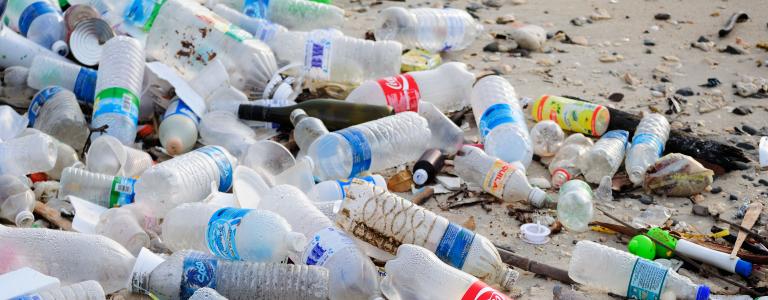Beating Plastic Pollution: If you can't reuse it, refuse it
June 5 marks World Environment Day, with a focus on reducing the heavy burden plastic pollution places on nature, wildlife and human health. This blog explains four ways we can all make a difference.
Tomorrow marks World Environment Day, with a focus on reducing the heavy burden plastic pollution places on nature, wildlife and human health.
Plastic has many valuable uses, but as a global community we have become over-reliant on single-use or disposable plastic products. In fact, the United Nations reports that half of all consumer plastics are used a single time.
To beat plastic pollution, we need to rethink how we design, produce and use plastic products.
Here are four ways we can all make a difference:
- Avoid purchasing products with excess packaging: As consumers, we can all make smarter choices, such as turning down plastic straws and cutlery or reconsidering heavily packaged products in the supermarket. With enough demand, retailers and suppliers will quickly get the message and make changes for the better.
- Choose glass or metal drink containers over plastic: Statistics suggest one million plastic bottles are bought every minute. Sure, they can be recycled, but unfortunately most of them are not. In 2016, the recycling rate for plastic bottles in the United States was around 30 per cent. That means two out of every three bottles will end up in a landfill.
- Choose wool over synthetic garments: A major source of microplastic fibers turns out to be synthetic clothing (like solar fleece jackets and pullovers). While wastewater treatment plants can effectively remove a large quantity of microplastics (up to 98 per cent), a 2016 study determined that the average wastewater treatment plant still releases 4 million particles per day (and as many as 65 million).
- Sign up to participate in a shoreline or neighbourhood cleanup near you: By picking up the litter you see in front of you, you are not only making an immediate impact, you may also be sending a strong signal that will keep people from littering in future—people litter less and use garbage bins more in places that are kept clean. Therefore, community cleanups have a wider impact by raising awareness, educating others about plastic waste and reducing the urge to litter.
Of course, individual actions alone cannot solve the plastic problem. Even if every one of us does whatever we can to reduce our plastic footprint, the problem needs to be addressed at other levels.
Governments and businesses must also play a major role, in thinking about eliminating single-use plastics at the design stage, ensuring waste management and recycling schemes are fit for purpose, and researching sustainable plastic alternatives that are both economically viable and widely available. Only then will we be able to beat plastic pollution for good.
You might also be interested in
This Is What Young People Have to Say About INC-5
The treaty must address the entire life cycle of plastics, youth tell INC-5 negotiators. We couldn’t agree more.
COP 29 Outcome Moves Needle on Finance
In the last hours of negotiations, concerted pressure from the most vulnerable developing countries resulted in an improved outcome on the finance target, with a decision to set a goal of at least USD 300 billion per year by 2035 for developing countries to advance their climate action.
Stabilization Clauses: The hidden provisions that can hinder tax and investment policy reform
Stabilization clauses should no longer automatically be included in contracts between states and investors. If they are, they should, at a minimum, build on the latest international standards on stabilization to avoid being a barrier to sustainable development.
Why Trade Matters in the Plastic–Pollution Treaty Negotiations
The global push to end plastic pollution by 2040 highlights the critical intersection of trade and environmental action, with upcoming INC-5 negotiations focusing on reducing plastic production, consumption, and waste within a fair and effective international framework.
